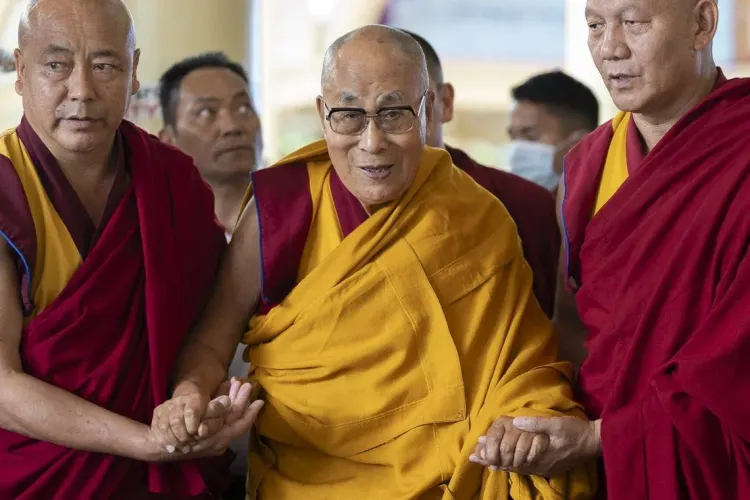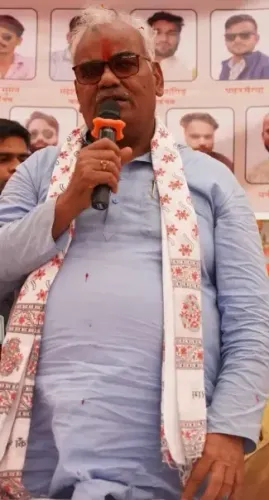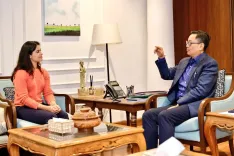Will the Dalai Lama's 600-Year-Old Reincarnation Tradition Continue?

Synopsis
Key Takeaways
- Dalai Lama's confirmation of the 15th reincarnation ensures the future of the institution.
- The Gaden Phodrang Trust is the sole authority in recognizing the next Dalai Lama.
- China's insistence on control poses challenges to Tibetan Buddhist traditions.
- The Dalai Lama’s commitment to global dialogue highlights the importance of intercultural understanding.
- Preservation of Tibetan culture remains a central focus for the exiled community.
Dharamsala, July 2 (NationPress) As the exiled Tibetan spiritual leader Dalai Lama nears his 90th birthday, he confirmed on Wednesday that there will indeed be a 15th reincarnation, marking the first significant announcement regarding the future of the 600-year-old institution after his passing.
In a reassuring message to followers worldwide who were anxious about the future of their spiritual and cultural guidance, His Holiness declared that his office, the Gaden Phodrang Trust, holds the exclusive authority on matters of reincarnation, despite China's insistence on having the final say.
Shortly after the Tibetan spiritual leader dismissed Beijing's claim over his succession, China emphasized that the reincarnation must receive approval from the Chinese government, and the identification process must occur within China.
Furthermore, the alleged reincarnation must adhere to religious practices and historical conventions while complying with Chinese laws and regulations.
Chinese Foreign Ministry spokeswoman Mao Ning stated, "The reincarnation of the Dalai Lama, the Panchen Lama, and other prominent Buddhist figures should be selected through a lottery from a golden urn, subject to approval by the central government," referencing a selection method implemented by an emperor of the Qing Dynasty in the 18th century.
Nonetheless, Tenzin Lakshey, spokesperson for the Central Tibetan Administration (CTA) based in McLeodganj, emphasized that China has no role in the reincarnation process of any Tibetan religious leader. "The Chinese government is an offender of the faith," he remarked to reporters.
During a much-anticipated address at a three-day Buddhist conference in McLeodganj, a charming hill station near the northern town of Dharamsala, the Dalai Lama recounted, "On September 24, 2011, I informed the leaders of Tibetan spiritual traditions that the decision regarding the continuation of the Dalai Lama institution should rest with the concerned parties."
He further noted, "I had indicated as far back as 1969 that the decision about the future reincarnations of the Dalai Lamas should be made by those concerned. I also stated that when I reach the age of ninety, I would consult with the high Lamas of Tibetan Buddhism, the Tibetan public, and other interested parties to reassess the future of the Dalai Lama institution. Although I haven’t publicly addressed this issue until now, over the past 14 years, spiritual leaders, members of the Tibetan parliament in exile, and various groups have earnestly requested the continuation of the Dalai Lama institution," he stated.
"I have particularly received messages from Tibetans inside Tibet echoing this same sentiment. Therefore, I affirm that the institution of the Dalai Lama will continue," he concluded.
The Nobel Peace Laureate, turning 90 on July 6, clarified that the process for recognizing a future Dalai Lama has been explicitly defined in the 2011 statement, which assigns this responsibility solely to the Gaden Phodrang Trust.
"They must consult various heads of Tibetan Buddhist traditions and the reliable oath-bound dharma protectors connected to the Dalai Lama lineage. They should carry out the search and recognition process based on past traditions. I reiterate that the Gaden Phodrang Trust holds the exclusive authority to identify the future reincarnation; no one else has the right to interfere in this matter," he asserted.
In Tibetan tradition, the recognition of a Lama's reincarnation, especially that of the Dalai Lama, is a revered process, not an appointment. It involves visions, signs, and profound spiritual rituals. Only the Dalai Lama possesses the legitimate authority to identify his successor.
While celebrating his 90th birthday on June 30, the Dalai Lama shared with attendees, "Although I am now 90 years old, I am physically healthy and well. Throughout my life, I have worked for the benefit of Tibetans and the Dharma. I have also formed connections with individuals worldwide and engaged in fruitful discussions with scientists. My life has been meaningful. I have traveled to many nations and interacted with diverse people. I consider my life as a human being to have been beneficial to the world, and I dedicate the remainder of my life to helping others."
Sixty-six years ago, the 14th Dalai Lama, disguised as a soldier, fled Norbulingka Palace in Tibet, a Third Pole, and escaped to India after a challenging 14-day journey. Since then, he has been the longest-respected guest of the Indian government, often expressing his enjoyment of the freedom he has, while advocating for human values, religious harmony, and the preservation of the Tibetan language and culture inherited from India's Nalanda University masters.
The Dalai Lama, along with a group of soldiers and cabinet ministers, fled into exile on March 17, 1959, following China's suppression of a Tibetan uprising.
Considered a living embodiment of compassion, the Dalai Lama shares insights into his decades-long engagement with China in his latest book, ‘In Voice for the Voiceless’.
This book serves as a reminder of Tibet's ongoing struggle for freedom and the challenges faced by his people in their homeland. It reveals his extraordinary life, detailing the loss of home to a repressive invader and the journey of building a life in exile; confronting the existential crisis of a nation, its people, and its culture and religion; and envisioning a path forward.
He was merely 16 when Communist China invaded Tibet in 1950, just 19 when he first met Chairman Mao in Beijing, and 25 when he was compelled to flee to India, becoming a leader in exile.
Upon reaching India after a perilous journey, the Dalai Lama first resided in Mussoorie, Uttarakhand, for approximately a year.
On March 10, 1960, before relocating to Dharamsala, a town nestled in the upper reaches of north India’s Kangra Valley, the Dalai Lama had stated: "For us in exile, our primary focus must be on resettlement and the preservation of our cultural traditions. We, Tibetans, will ultimately succeed in regaining our freedom for Tibet."
Currently, India is home to around 100,000 Tibetans and the government-in-exile.
(Vishal Gulati can be contacted at vishal.g@ians.in)









